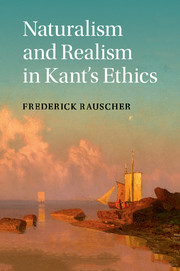Book contents
- Naturalism and Realism in Kant’s Ethics
- Naturalism and Realism in Kant’s Ethics
- Copyright page
- Contents
- Book part
- Citations of Kant’s writings
- Introduction
- Part I Laying the ground
- 1 Moral realism and naturalism
- 2 The place of ethics in Kant’s philosophy
- Part II Practical reason in nature
- Part III Morality beyond nature?
- Works cited
- Index
2 - The place of ethics in Kant’s philosophy
from Part I - Laying the ground
Published online by Cambridge University Press: 05 December 2015
- Naturalism and Realism in Kant’s Ethics
- Naturalism and Realism in Kant’s Ethics
- Copyright page
- Contents
- Book part
- Citations of Kant’s writings
- Introduction
- Part I Laying the ground
- 1 Moral realism and naturalism
- 2 The place of ethics in Kant’s philosophy
- Part II Practical reason in nature
- Part III Morality beyond nature?
- Works cited
- Index
Summary
- Type
- Chapter
- Information
- Naturalism and Realism in Kant's Ethics , pp. 50 - 78Publisher: Cambridge University PressPrint publication year: 2015



